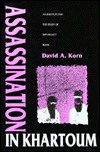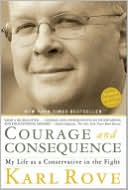Assassination In Khartoum
"Korn has written a fast-pased and absorbing account of the murder of two American diplomats held hostage in the Saudi embassy in Khartoum in 1973."\ —Foreign Affairs\ "... engrossing... well-crafted... a gripping story of personal courage and tragedy." —Foreign Service Journal
Search in google:
"Korn has written a fast-pased and absorbing account of the murder of two American diplomats held hostage in the Saudi embassy in Khartoum in 1973." — Foreign Affairs"... engrossing... well-crafted... a gripping story of personal courage and tragedy." — Foreign Service Journal Publishers Weekly In 1973, Palestinian Black September gunmen stormed the Saudi Arabian embassy in Khartoum where two U.S. diplomats and a Belgian colleague were attending a reception and threatened to kill them unless their demands were met. Among their demands were the releases of Sirhan Sirhan, convicted killer of Robert Kennedy, and of Palestinians imprisoned in Jordan and Israel. President Richard Nixon--establishing a policy which remains in effect--refused to negotiate. This dire decision, as Korn reveals, doomed the three captives, set off an internal furor within the State Department and caused the White House to issue preemptive statements defending Nixon against accusations that the policy was a shocking display of indifference to Americans abroad in distress. The Belgian government attempted to ransom with money the release of its diplomat, Guy Eid. Korn, a former Foreign Service officer, presents a tense, compelling, carefully researched account of the abduction, the 59-hour siege of the Saudi embassy, the assassination of the diplomats, the surrender of the gunmen and their unexpected release by the Sudanese government. Korn explores the intriguing theory that Eid was used by Black September to trap Ambassador Cleo Noel and George Moore, deputy chief of mission, and was betrayed by the Palestinians. Korn is the author of Stalemate: The War of Attrition and Great Power Diplomacy in the Middle East, 1967-1970. (Nov.)
\ Publishers Weekly - Publisher's Weekly\ In 1973, Palestinian Black September gunmen stormed the Saudi Arabian embassy in Khartoum where two U.S. diplomats and a Belgian colleague were attending a reception and threatened to kill them unless their demands were met. Among their demands were the releases of Sirhan Sirhan, convicted killer of Robert Kennedy, and of Palestinians imprisoned in Jordan and Israel. President Richard Nixon--establishing a policy which remains in effect--refused to negotiate. This dire decision, as Korn reveals, doomed the three captives, set off an internal furor within the State Department and caused the White House to issue preemptive statements defending Nixon against accusations that the policy was a shocking display of indifference to Americans abroad in distress. The Belgian government attempted to ransom with money the release of its diplomat, Guy Eid. Korn, a former Foreign Service officer, presents a tense, compelling, carefully researched account of the abduction, the 59-hour siege of the Saudi embassy, the assassination of the diplomats, the surrender of the gunmen and their unexpected release by the Sudanese government. Korn explores the intriguing theory that Eid was used by Black September to trap Ambassador Cleo Noel and George Moore, deputy chief of mission, and was betrayed by the Palestinians. Korn is the author of Stalemate: The War of Attrition and Great Power Diplomacy in the Middle East, 1967-1970. (Nov.)\ \ \ \ \ Library JournalUsing declassified documents and personal interviews, Korn, a former Foreign Service officer and author of Stalemate: The War of Attrition and Great Power Diplomacy in the Middle East, 1967-70 ( LJ 6/1/92), chronicles the events surrounding the murders of Cleo A. Noel Jr. and George Curtis Moore, two U.S. diplomats taken hostage in the Saudi Arabian embassy in Khartoum by Black September terrorists in March 1973. The people and events are described in remarkable detail, and the reader is drawn into the history and politics of the Middle East and the U.S. State Department. The book also fills some important gaps in our understanding of the time. Korn's account of diplomatic and intelligence failures and successes will certainly appeal to specialists on Middle Eastern politics and diplomacy, while his description of the development and bungled application of America's ``no negotiation, no compromise'' antiterrorism policy will interest terrorism experts. Informed lay readers will find the character studies of interest.-- William Waugh, Georgia State Univ., Atlanta\ \








